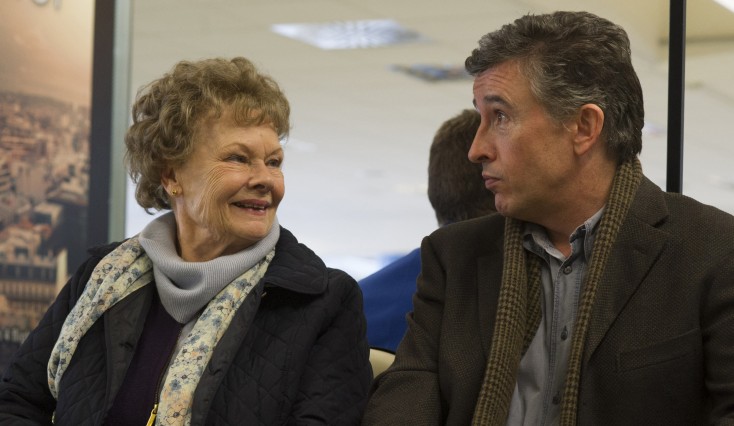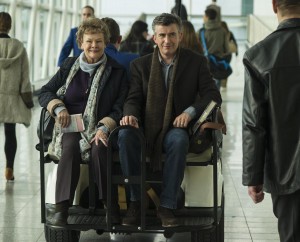By ANGELA DAWSON
Front Row Features
NEW YORK—British actor Steve Coogan is best known for his biting sense of humor. But having grown up in the Catholic faith (his family hails from Ireland), he has experienced disillusionment with his faith over the years and no longer considers himself a practicing Christian.
When he came upon the story of Philomena Lee, a fellow Irish-Catholic, who set forth several years ago to find her long lost son, he was fascinated. As a young woman, Philomena had gotten pregnant out of wedlock and was forced to give up her son for adoption at the instance of the Church. She signed a document saying she wouldn’t seek him out. Nearly 50 years later, she decided to begin her search for the boy she called Anthony, but ran into roadblocks at the Irish abbey where she and her son lived for three years. A cynical former BBC reporter named Martin Sixsmith, looking for a good human interest story to jumpstart his failing career, agreed to help her discover what happened to her long lost son. He learned something about himself along the way.
Coogan, 48, extensively researched the subject of forced adoptions and saw a tragic and also heartwarming story in Philomena’s search. He co-wrote the script of “Philomena,” based on Sixsmith’s book “The Lost Child of Philomena Lee,” and convinced Oscar-winning actress Dame Judi Dench to come on board as the title character. Academy Award nominated director Stephen Frears (“The Queen,” “The Grifters”) directs. Coogan plays Martin, who learns about compassion and forgiveness in the process of helping the eternally optimistic and faith-driven former nurse on her quest. Coogan is nominated for two Academy Awards, for best adapted screenplay and best picture. Dench is an Academy Award nominee for her performance in the film.
The outspoken performer recently discussed what moved him to want to write the screenplay, working with the famed Dench and his own experience and views on the Catholic Church.
Q: You’ve had your run-ins with the British tabloid press, and yet here you’re playing a reporter. Do you see some irony in this?
Coogan: The whole thing of me playing a journalist only occurred to me halfway through writing the script. It was only when I was doing publicity afterwards that people brought it up. To me, it was about the story. I just happened to be playing a journalist. I knew I was playing a cynic. I could be a cynical anything. But I suppose there’s something in there about my campaign in the UK about press regulation, but it was subliminal. It wasn’t like, “Oh, this is what I’m going to tell people what I think of the press.”
Q: What happened?
Coogan: Years ago I got caught with my pants down, when I was doing things I shouldn’t have been doing, and it ended up all over the newspapers. It was 15-16 years ago. It’s way in the past. My involvement with the tabloids recently is about self-regulation of the press. I found that my film was hacked and I sued News International, Rupert Murdoch’s company. I sued and we settled. They gave me some money but it wasn’t as much as I spent (on lawyers). I didn’t care. I wanted to help raise the issue. It led to a public inquiry. My involvement along with others sort of helped give the story momentum. The (courts) found out that they’ve been hacking the victims of crime, their phones, so the whole thing snowballed and became this big issue, which led to a public inquiry. So now there’s a debate on how to make self-regulation of the press effective and not the toothless body it had been before. So I’ve been part of that in the UK. To me, that was something I was involved in because I have a public platform and a lot of other people didn’t want to get involved because they were afraid of upsetting newspaper editors whom they were afraid would come after them. I don’t give a **** about that. They’d already come after me, so I did get involved. But it wasn’t what motivated me in becoming involved in this project.
Q: So what was the impetus to write this?
Coogan: I’m creative. I write. I wanted to tell a story. I came across this story. It moved me. I felt connected with it, the subject matter. I’m half Irish. I’m Catholic. I was raised Catholic. So I feel I have license to properly connect with the subject matter, and not fall into clichés about how the Irish are rendered and how religion is represented.
Q: Can you talk about the research you did in Ireland and were people willing to talk?
Coogan: Of course, people didn’t want to talk about it. I retraced some of Martin’s footsteps. I went and looked around the abbey, and had a look around as any self-respecting, good journalist would. So I did my own research as a writer and felt sometimes like I was walking in the footsteps of Martin. In fact, one of the scenes from the film, for example, happened to me. When I sat down with Philomena and Martin at his house, I saw some video footage of (her son) Anthony and I was sitting next to Philomena. She hadn’t seen this footage before of him when he was three years old. The footage was of her son the last time she saw him. And she suddenly became overwhelmed, grabbed my hand and said, “I did love him, you know.” I put that line in the film as if it had happened to Martin, but in reality, it happened to me. So there’s a lot of art imitating life the way I went about this.
Q: This is more than a detective story. It’s a story about Martin and Philomena, it seems.
Coogan: One of my touchstones for this film was “Missing,” with Sissy Spacek and Jack Lemmon. They go on a journey looking for a missing son. In actual fact, they learn something about each other. That’s a bit of a detective story. So I knew it was possible to do it. But I also wanted it to be about the two of them rather than the son they were looking for. It’s about their attitudes toward life. There were various things I wanted to explore: his cynicism versus her optimism, his intellect versus her intuition, and class. She’s working class and he’s upper middle class. They’re from different backgrounds and he’s very much part of the British establishment. She’s this working-class Irish lady. The Irish, in England, are still slightly outside the establishment. Americans have much warmer feelings towards the Irish. It’s changed a lot (in England) but certainly historically.
Q: Were you concerned that Dame Dench would be too frail?
Coogan: I wasn’t concerned that she was too frail. It’s only that if you’re playing the lead, there are not many parts for a character of that age that are the lead role. Generally, when actors get to be that age they play supporting roles. I’d be concerned for anyone of that age. She’s not frail. She’s got a bad knee but she’s quite feisty, confident and has real energy. It’s still tough, though.
Q: You went to her house and read the script with her, right?
Coogan: Yeah. I went to her house twice. The first time I went I just told her the story. We talked for about an hour. That was great because she was captivated and moved by it, and was interested (in being in the film).
Q: Do you think that institutional changes, meaning more openness about past sins that may have been committed by the Church, will come about soon?
Coogan: The new pope seems to be a progressive person, whom I’m really hopeful about. He seems to be someone who listens and who sees the whole of humanity rather than being dogmatic.
Q: Philomena is depicted in the film as having this amazing capacity for forgiveness. Did her understanding surprise you?
Coogan: Yes. I asked her, “Do you forgive them for what they did to you?” And she said, “Yes, I do.” And her daughter said immediately, “I don’t.” So I put both things in there. So I thought, I want to put both of those things in there. You don’t have to be prescriptive and say, “This is the right thing to do” or “This is the wrong thing to do.” But you can admire the grace of somebody who has the capacity to do that. Also, Philomena didn’t want to come across as a victim or naïve. In fact, she says (in the film), “I don’t want to go through my life hating people. I don’t want to be like (Martin).” Martin’s problem is that he’s full of anger, directionless anger. She’s got this grace, which is a result of her faith. That’s what I wanted to do. You can criticize the institution. I think the reason why the clergy in Ireland are annoyed with me is because I didn’t launch a blanket attack on the Church. I showed people of simple faith. I’m not one of them, but there are people in my life that I love and respect who are religious and good people. I want to acknowledge them through “Philomena,” which I think the film does.
Q: What did the practice of confession mean to you while growing up?
Coogan: When I was going up, you’d go in and get a clean sheet. I remember once my brother didn’t have anything to say and so he hit his best friend just so he could tell something to the priest.
Q: Did you ever have run-ins with the nuns when you were growing up?
Coogan: I was educated by Catholic brothers. They were quite liberal minded. Most were closet Marxist rather than closet gays. They would talk about politics in Latin America and liberation theology. They were very liberal. But I remember our parish priest was very conservative. I think he had a mass for (Spanish dictator) Franco when he died. It didn’t matter that he was a Fascist. He was a Catholic, and that’s all that mattered.
Q: Were you trying to make a point about family?
Coogan: I don’t know. I was just trying to make a point about the notion of Philomena losing her son and perhaps Martin fulfilling that role. There’s a scene at the hotel, where he has to call her “mother” to get into the room. I liked that because he feels awkward about it, and the reason he feels awkward is because it’s obviously occurred to him in his subconscious. He’s clearly touched.





